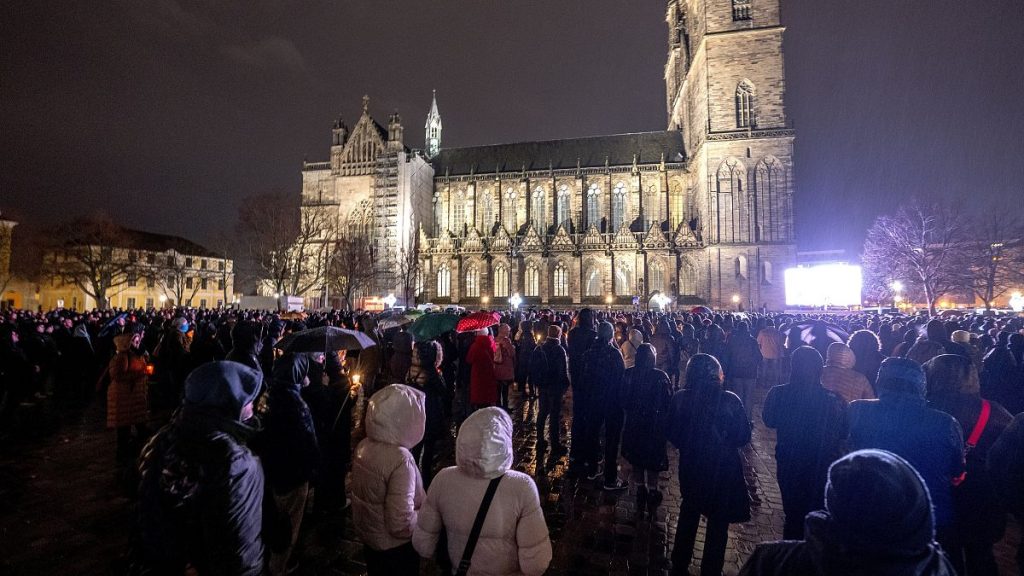The peaceful Christmas spirit in Magdeburg, Germany was shattered on Friday evening when a car plowed into a bustling Christmas market, leaving a scene of carnage and grief. Five lives were tragically lost, including a nine-year-old child, and approximately 200 individuals were injured, with 41 sustaining severe injuries that raised fears of a rising death toll. The attack, which authorities are treating as deliberate, sent shockwaves through the city and the nation, casting a pall over the holiday season. As the city mourned, church bells tolled across Magdeburg at 7:04 pm on Saturday, the precise time of the attack, serving as a somber reminder of the tragedy that had befallen their community. High-ranking officials, including Chancellor Olaf Scholz, Vice-Chancellor Robert Habeck, and President Frank-Walter Steinmeier, attended a service at Magdeburg Cathedral, demonstrating national solidarity with the grieving city.
The alleged perpetrator, identified in media reports as Taleb A., a 50-year-old doctor who immigrated from Saudi Arabia in 2006, surrendered to authorities at the scene. He faces serious charges, including five counts of suspected murder and 205 counts of suspected attempted murder. Investigators are exploring various potential motives, including whether the attack stemmed from dissatisfaction with Germany’s treatment of Saudi refugees. However, the exact reasons behind the horrific act remain unclear. Taleb A.’s online activity on the social media platform X paints a picture of a man preoccupied with anti-Islam sentiments, frequently criticizing the religion and praising those who left the faith. He also expressed concerns about what he perceived as the “Islamification of Europe,” accusing German authorities of inaction.
Taleb A.’s history with German authorities dates back several years. In 2013, he was convicted of disturbing the peace through threats of violence. Furthermore, reports indicate that Saudi Arabia had issued warnings to Germany regarding his extremist views, though the specifics of these warnings remain unclear. A year prior to the attack, German police had planned to issue Taleb A. a “Gefährderansprache,” a warning given to individuals deemed potential threats. However, this warning was never delivered, the reasons for which remain undisclosed. This revelation has raised questions about whether the tragedy could have been averted.
The attack, occurring just days before Christmas, has sent shockwaves throughout Germany. Many communities, in a show of solidarity with Magdeburg and as a precautionary measure, cancelled their weekend Christmas markets. The tragedy underscored the vulnerability of public spaces and the fragility of life, particularly during a season typically associated with joy and togetherness. Magdeburg’s Catholic Bishop, Gerhard Feige, articulated the collective sense of shock and helplessness, emphasizing the stark contrast between the festive spirit and the horrific act of violence. He also expressed gratitude for the volunteers and emergency responders who provided immediate support and comfort in the wake of the tragedy.
While many gathered at the scene of the attack with candles to mourn the victims, a darker element also emerged. Several hundred far-right protesters assembled in a central square in Magdeburg, displaying a banner that read “remigration.” This demonstration highlighted the potential for such tragedies to be exploited by extremist groups to fuel their own agendas. In response to the heightened security concerns, Berlin, while keeping its Christmas markets open, increased police presence. This tragic event serves as a stark reminder of the ongoing challenges posed by extremism and the need for vigilance in protecting public spaces.
This attack is unfortunately not an isolated incident. Germany has grappled with a series of extremist attacks in recent years, including a knife attack in Solingen in August that claimed three lives and injured eight others. The Magdeburg Christmas market attack also resonates with the devastating 2016 Berlin Christmas market attack, where an Islamic extremist used a truck to kill 13 people and injure many more. These recurring acts of violence underscore the persistent threat of extremism and the ongoing need for effective strategies to combat it and ensure public safety. The Magdeburg tragedy has left a deep wound on the community and the nation, raising crucial questions about security measures, the treatment of potential threats, and the broader societal challenges posed by extremism.














